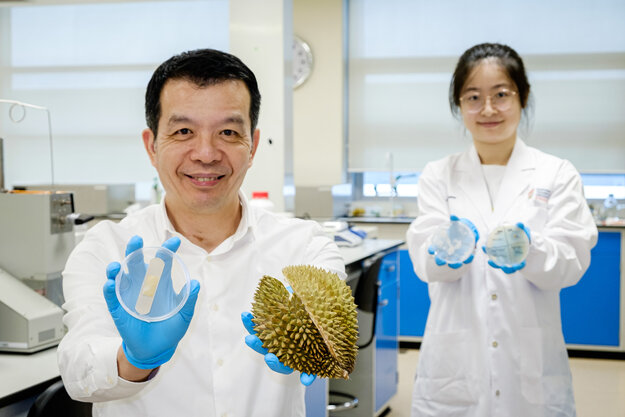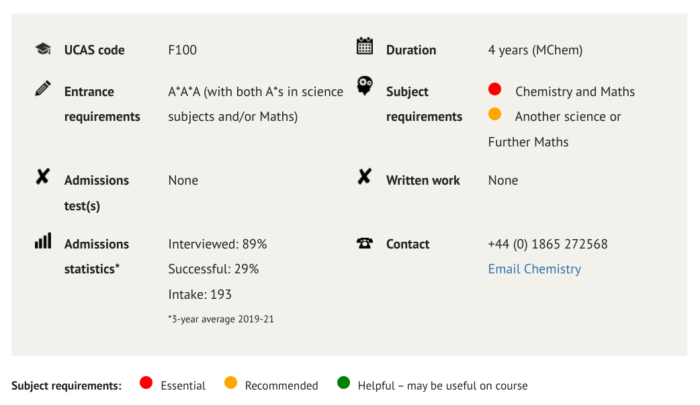Chemistry Universities: What the Rankings Say
In our post on the top universities for studying mathematics, we used the QS World Rankings by Subject system, so we’ll do the same for this post. As always, our recommendation is not to take the rankings too seriously or literally – there are different ranking systems, each with its own criteria. Also, your tertiary education is what YOU make of it, so whether you attend an Ivy League university or one that doesn’t even feature in the top 400, it comes down to the dedication and effort you put into learning and growing academically and personally! My alma mater isn’t ranked very high in the global list of rankings, BUT I can guarantee that my university has produced some of the world’s best academics and researchers!
Let’s get to the top-ranking universities for chemistry in the UK, the US, and other countries.
Chemistry University Rankings UK 🇬🇧
The QS University Ranking System bases its scores on six indicators: academic reputation (teaching and research quality), employer reputation (how well these universities prepare their students for the job market), faculty/student ratio, citations per faculty, and international student/international faculty ratio.
The top five universities for studying chemistry in the UK are:
- University of Cambridge (overall score of 94.7).
- The Department of Chemistry at Cambridge, known as the Yusuf Hamied Department of Chemistry, has about 200 postdoctoral research staff, over 250 postgrad students, and about 60 academic staff. Check out the Chemistry Department’s Twitter account, @ChemCambridge, to get a taste of what you can expect!
- University of Oxford (overall score of 93.5).
- The Department of Chemistry at the University of Oxford (beginning in 1860) has around 80 academic staff and a yearly research income of about 15 million GBP. In 2021, almost 70% of Oxford’s chemistry research was deemed world-leading by the national assessment of research.
- Imperial College London (ICL) (overall score of 88).
- The chemistry department at ICL dates back to 1845, and its first professor, August Wilhelm von Hofmann, was a leader in organic chemistry. All of the courses at ICL are accredited by the Royal Society of Chemistry.
- The University of Manchester (overall score of 82.4).
- The chemistry department at the University of Manchester is one of the largest in the UK, with almost 700 undergraduate students, 250 postgrad research students, and 120 postdoc researchers. And a super cool fact: Manchester is the birthplace of modern chemistry, thanks to John Dalton and his atomic theory!
- University College London (UCL) (overall score of 81).
- UCL’s chemistry department, dating back to 1826, is ranked 2 in the UK for most impactful research. Keep up with its research by following the UCL Chemistry Twitter account!

The Chemistry Department at the University of Oxford held a photography competition this year. This photo by Beth Watkins won first place in the Teaching and Learning category. It shows blackboard notes from a lecture during Hilary Term 2022.
And if you’re interested, watch the video below on doing a postgrad in chemistry at the University of Cambridge!
‘This is a really great department. We have a very proud history with Nobel Prize winners. We have consistently been the top-ranked research chemistry department in the United Kingdom, and we are third in the international QS rankings … We cover a huge breadth of research from theoretical chemistry through synthesis and biological chemistry into material science, energy, climates, air quality. I think we’re currently addressing a number of major issues of concern to society in the 21st century … we have a number of groups who are working on sustainable energy … and then we have scientists working on those climate problems and air quality problems.’– Prof. John Pyle, Head of Department, Chemistry, University of Cambridge
And if The University of Manchester sounds good to you, check out this introductory video on the School of Chemistry:
Chemistry University Ranking US 🇺🇸
The top five universities for studying chemistry in the US are:
- Massachusetts Institute of Technology (MIT) (overall score of 97.2)
- MIT offers an extensive range of topics for undergrad and grad students wanting to study chemistry. For example, you can find classes on the Dimensions of Geoengineering, Principles of Organometallic Chemistry, Crystal Structure Refinement, Archaeological Science, Chemistry Laboratory Techniques, Fundamentals of Spectroscopy, Recombinant DNA Technology, Heterocyclic Chemistry, and Quantum Chemical Simulation.
- For a bit of fun, you can read this article from a graduate student at MIT. He talks about his research and answers a fun 20 questions!
- Harvard University (overall score of 96.5)
- The Department of Chemistry and Chemical Biology at Harvard is committed to discovering new chemical phenomena, creating novel technologies for a better world, and developing new medicines for incurable diseases. Fun fact: Harvard’s first experimental chemical laboratory was built in 1850 and had no gas or water! Over 500 people currently teach, work, and conduct research at Harvard’s chemistry department.
- Stanford University (overall score of 95.5)
- Stanford chemist Carolyn Bertozzi won the 2022 Nobel Prize in chemistry for her work on bioorthogonal reactions. Check out the video below to hear her talk about her research in 60 seconds! Carolyn was also a graduate of Harvard and UC Berkeley, where she spent many years developing her prize-winning research.
- University of California, Berkeley (overall score of 94)
- UC Berkeley’s College of Chemistry is celebrating its 150th anniversary this year. Check out this video to see the past, present, and future of this prestigious college! You can also follow @UCB_Chemistry on Twitter to see the latest news and research.
- California Institute of Technology (overall score of 90.6)
- Caltech’s Division of Chemistry and Chemical Engineering has a long history of achievement, with numerous alums receiving the Nobel Prize. And fun fact: Arnold Beckman, who graduated in 1928, invented the pH meter!
You can follow this link if you’d like to see how different US universities rank for different topics/fields in chemistry.
Best Chemistry Universities List by Continent 🗺
And here are the top-ranked universities for chemistry per continent. Note that we’ve excluded the universities mentioned above in the UK and US.
Latin America
- Universidade de São Paulo, Brazil (tied at 92 in the world).
- Universidade Estadual de Campinas, Brazil (114 in the world).
- Universidad Nacional Autónoma de México, Mexico (tied at 130 in the world).
Africa
- Cairo University is ranked between 251 and 300 in the world.
- Ain Shams University, Egypt, is ranked between 401 and 500 in the world.
- University of Cape Town, South Africa, is ranked between 401 and 500 in the world.
- University of the Witwatersrand (or Wits, my alma mater) is ranked between 501 and 550 in the world.
And how could I not include a video from my home university? Check out this super helpful video on how to read the volume off of a burette. There are also other insightful videos from Wits postgrad chemistry students to help you if you’re a new chemistry undergrad student!
Europe
- EPFL, Switzerland (9 in the world).
- ETH Zurich (tied at 10 in the world).
- Technical University of Munich (TUM) (22 in the world).
- Delft University of Technology, The Netherlands (tied at 30 in the world).
- Université de Strasbourg, France (tied at 43 in the world).
Fun fact: StudySmarter was founded by students of TUM! Also, check out what Attila Oláh has to say about studying chemistry at TUM:
‘I studied at TU Munich for my master’s degree in chemistry with a focus on organic and inorganic chemistry. During my Master’s research and chemical problem-solving, it was clear that we were being prepared well for a PhD in chemistry. Class sizes range from 3–30 participants and are usually conducted in a seminar or tutorial style. The curriculum is designed to allow you to put classes together based on your topic preferences with a significant amount of internships in different research groups for gaining hands-on research experience.’
Asia
- Nanyang Technological University (NTU), Singapore (7 in the world).
- National University of Singapore (8 in the world).
- Peking University, China (12 in the world).
- University of Tokyo, Japan (16 in the world).
- Tsinghua University, China (17 in the world).

Food scientists at NTU have developed an antibacterial gel bandage from the husks of durian, a tropical fruit.
Oceania
- Monash University, Australia (tied at 37 in the world).
- The University of Melbourne (tied at 39 in the world).
- The University of Sydney (tied at 62 in the world).
Nobel Prize Winners in Chemistry from Leading Chemistry Universities
Below is a list of some Nobel Prize Winners in Chemistry who studied at the universities mentioned in this post. As you can see, the likes of Harvard, Stanford, Oxford, and Cambridge feature prominently.
| Name | Award | University affiliation |
| Alfred Werner | 1913 for his work on the linkage of atoms in molecules. | ETH Zurich |
| Theodore William Richards | 1914 for his work in determining the atomic weight of a large number of chemical elements. | Harvard University |
| Frederick Soddy | 1921 for his work on radioactive substances and isotopes. | University of Oxford |
| Arthur Harden | 1929 for his work on the fermentation of sugar and fermentation enzymes. | The University of Manchester |
| Harold Urey | 1934 for his discovery of heavy hydrogen. | University of California, Berkeley |
| Walter Norman Haworth | 1937 for his work on carbohydrates and vitamin C. | University of Manchester |
| James B. Sumner | 1946 for his discovery that enzymes can be crystallised. | Harvard University |
| Linus Pauling | 1954 for his research on the nature of the chemical bond. | California Institute of Technology |
| Frederick Sanger | 1958 for his work on the structure of proteins (insulin). | University of Cambridge |
| Dorothy Hodgkin | 1964 for her determinations by X-ray techniques of the structures of biochemical substances. | Cambridge and Oxford |
| John Cornforth | 1975 for his work on the stereochemistry of enzyme-catalysed reactions. | The University of Sydney and Oxford University |
| Jerome Karle | 1985 for his work on developing direct methods for determining crystal structures. | Harvard University |
| Sidney Altman | 1989 for his joint discovery of the catalytic properties of RNA. | MIT |
| Richard R. Ernst | 1991 for his work on high-resolution nuclear magnetic resonance spectroscopy. | ETH Zurich |
| Robert Curl | 1996 for his joint discovery of fullerenes. | University of California, Berkeley |
| Alan G. MacDiarmid | 2000 for his joint work on discovering and developing conductive polymers. | University of Cambridge |
| Roger D. Kornberg | 2006 for his studies on eukaryotic transcription. | Harvard and Stanford |
| Martin Karplus | 2013 for his joint work on the development of multiscale models for complex chemical systems. | Harvard and the California Institute of Technology |
| Joachim Frank | 2017 for his joint work on developing cryo-electron microscopy. | University of Munich and Technical University of Munich |
| Frances Arnold | 2018 for her work on the directed evolution of enzymes. | University of California, Berkeley |
| Jennifer Doudna | 2020 for her joint work on developing a method for genome editing. | University of California, Berkeley |
| Carolyn Bertozzi | 2022 for her joint work on developing click chemistry and bioorthogonal chemistry. | Stanford University |
The Best Chemistry University Is …
Well, as we always say on our blog … you can make the most of your education wherever you are! Of course, studying at a prestigious university like Oxford or Harvard will give you access to state-of-the-art research facilities, unique learning opportunities, and outstanding academic staff, BUT having a university education from any university will open up many career paths for you.
When choosing a university, research it carefully and see what it offers regarding your interests. And when applying, make sure you read the application instructions carefully. Getting into top institutions will require more than just a quick application, so make sure you meet the criteria before applying. For example, find out what subjects you need to study at school and at which level, as well as what grades you need to achieve. That’s why you must always do your research a few years before applying to see what’s required of you. And regarding finances, yes, top universities can be very pricy, so be sure to check out our posts on scholarships and how to get them.
I hope you find your perfect match and bond well with your chemistry classmates 😉.

These are the University of Oxford entrance requirements to study chemistry. Notice that you must study chemistry AND maths in high school.
Frequently Asked Questions (F.A.Qs)
According to the QS World University Rankings by Subject for 2022, the best university to study chemistry is the Massachusetts Institute of Technology (MIT).
The USA and the UK have the highest-ranked universities for studying chemistry. Switzerland and Singapore also have universities ranked in the top 10 globally for chemistry.
This is subjective as it depends on what type of chemistry program you want to study. However, the Massachusetts Institute of Technology, Harvard University, Stanford University, the University of Cambridge, and the University of Oxford all have outstanding, world-renowned chemistry programs. These universities have all produced Nobel Prize winners in chemistry.
How we ensure our content is accurate and trustworthy?
At StudySmarter, we have created a learning platform that serves millions of students. Meet the people who work hard to deliver fact based content as well as making sure it is verified.

Gabriel Freitas is an AI Engineer with a solid experience in software development, machine learning algorithms, and generative AI, including large language models’ (LLMs) applications. Graduated in Electrical Engineering at the University of São Paulo, he is currently pursuing an MSc in Computer Engineering at the University of Campinas, specializing in machine learning topics. Gabriel has a strong background in software engineering and has worked on projects involving computer vision, embedded AI, and LLM applications.
Get to know Gabriel




